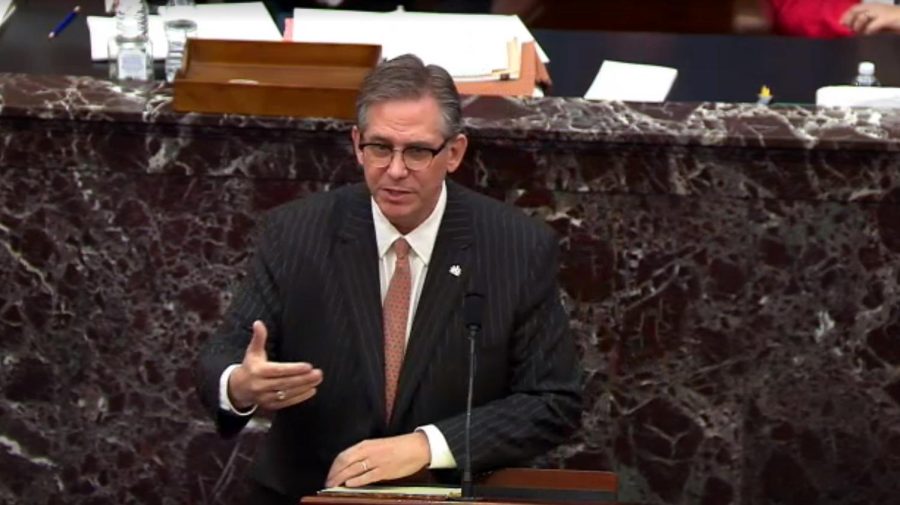As a historic second impeachment trial against Donald Trump occurs in the United States Senate this week, a face familiar to the Lafayette community occupies the defense’s table.
Attorney Bruce L. Castor Jr., a 1983 graduate of Lafayette, along with criminal defense attorney David Schoen, are organizing and executing the defense of former president Trump against charges that the he incited a riot on the capitol on January 6.
Castor, who studied Government & Law with minors in American history and international relations, recalled his time on College Hill with affection.
“My four years at Lafayette College were the best four years of my life. And that includes all the time I spent searching out, capturing and convicting killers, which I enjoyed a great deal,” Castor said in an interview with The Lafayette. “It was a wonderful, wonderful experience. And I look back fondly on it all the time.”
Following his studies at Lafayette and Washington & Lee University School of Law, Castor embarked on a 31-year career in public service, beginning in 1985 when Castor joined the Montgomery County District Attorney’s office as a legal assistant in the sex crimes unit.
By 2000, Castor was a district attorney, according to his Linkedin profile. His eight-year tenure as chief prosecutor for Montgomery County included numerous high profile cases where he drew praise for his litigation abilities. He was twice awarded by the Pennsylvania General Assembly for his work as Assistant District Attorney in the 1990s and was placed in the Pennsylvania police hall of fame in 2007, according to his law firm, van der Veen, O’Neill, Hartshorn, and Levin.
Castor also faced criticism in 2005 when he declined to charge actor and comedian Bill Cosby of sexual misconduct, citing an “unwinnable” case and a deal that he cut with Cosby, according to The Philadelphia Inquirer.
Castor concluded his government service with stints as Montgomery County Commissioner and as Acting Attorney General of Pennsylvania.
“I had already decided that I wanted to be a lawyer before I enrolled at Lafayette so I knew I would be representing people some time,” he said. “But at that point in my life, what I really wanted to do was be a law enforcement officer and prosecutor. So I did not give any thought to the types of clients I would be representing after I finished government service.”
Accordingly, Castor was in private practice when, less than two weeks before the trial was set to begin, he and Schoen joined Trump’s defense team after the former President’s previous lawyers resigned, according to CBS News.
“Impeachment is an inherently political process,” John Kincaid, government and law professor noted. “The fact that neither side wants to call witnesses so they get it over quickly indicates to me that this is just pure political theater.”
Trump’s attorney’s and leading Republicans contend that because Trump is no longer a sitting president, the trial is unconstitutional. Moreover, they argue that Trump’s address at the National Mall before the January 6 riot on the Capitol was within the realm of the First Amendment and did not constitute incitement.
“The short term political gain sought by those advancing impeachment and conviction is tremendously outweighed by the damage this proceeding is doing and will continue to do to this country and to the constitution, which has protected the rights of Americans for well over 200 years,” Castor said. “Those protections extend not only to popular people, but they were written for unpopular people. The Constitution protects the rights of the minority, not the rights of the majority.”
“When the government is happy with people, they don’t need protecting. It’s when the government and people are unhappy with a citizen, that they need to have their rights protected. And that is the takeaway. This is not a defense of one man, this is a defense of the Constitution of the United States and whether it means anything,” he concluded.
According to Kincaid, the counterarguments draw on two facts. Because at the time the Constitution was written most states permitted the impeachment of former officials, Democrats argue that the Constitution provision explicitly incorporates that ideal and would allow a trial of Trump. Moreover, they point to the case of Secretary of War William Belknap, who in 1876 was impeached and tried by the Senate after he left office.
“There’s no clear language of the Constitution which seems to limit impeachment to sitting officials, but that’s not one-hundred percent clear and it’s a debatable issue,” Kincaid explained. “Sixty-seven votes are needed to convict. There’s no way the Democrats are going to convince enough Republicans to do that so I think that the lack of a conviction is a foregone conclusion.”























































































































